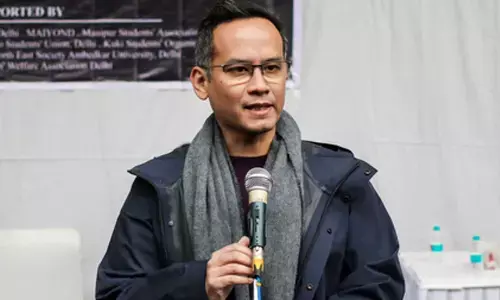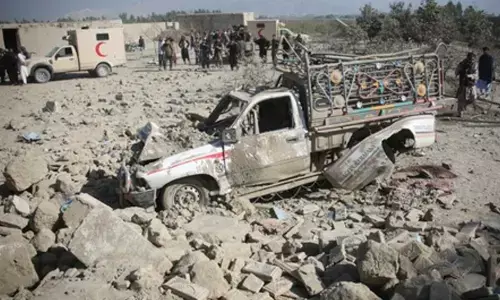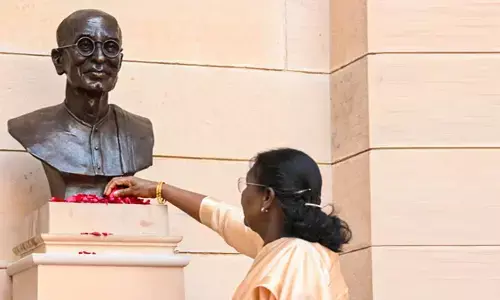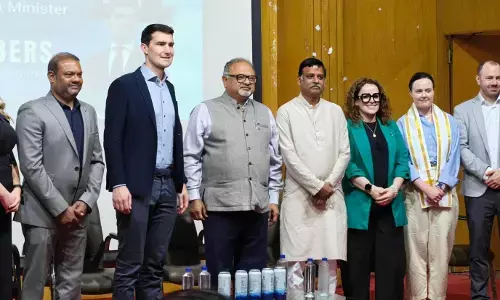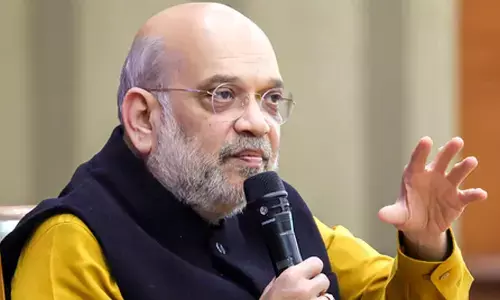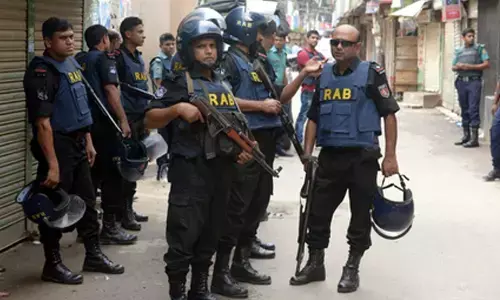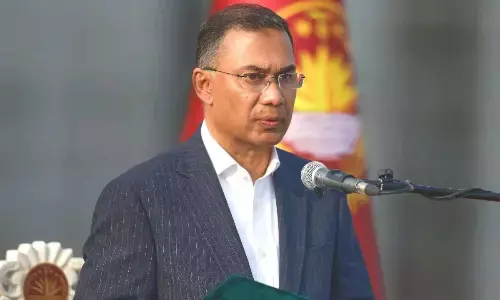Counter 'radicalisation' at home
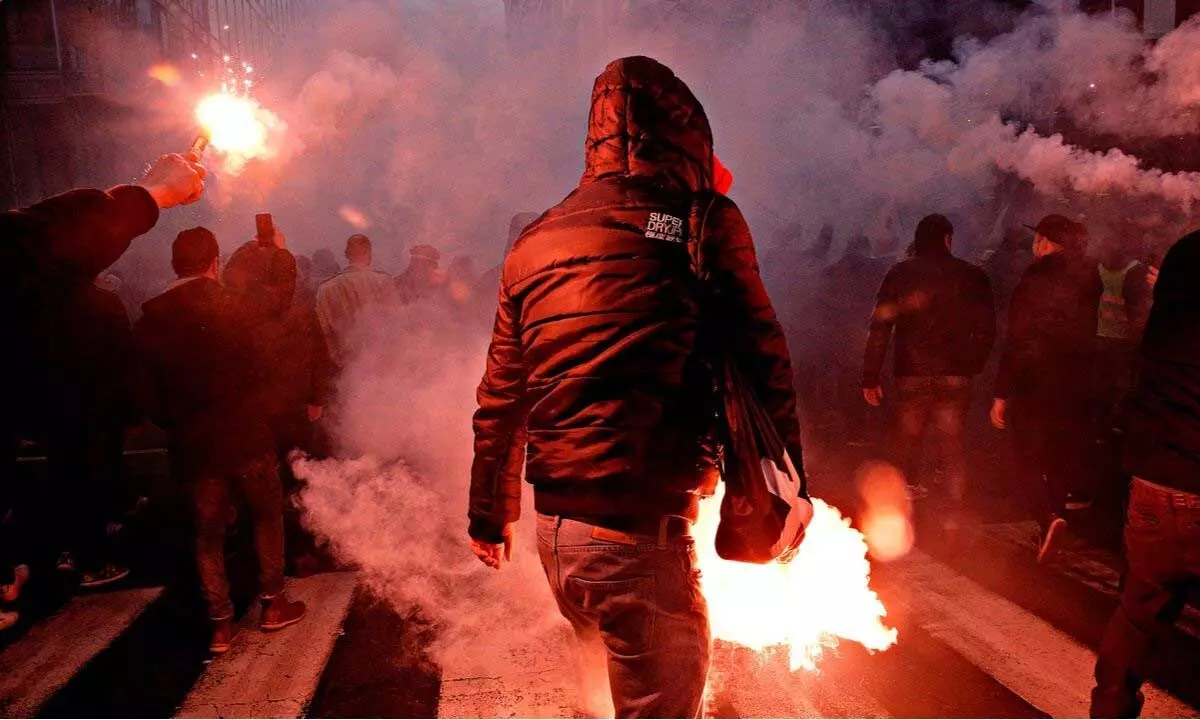
Counter 'radicalisation' at home
India's sane voice on various global issues has been heard and appreciated by the world community and there is little doubt that while steering the G20 Presidency through the year ahead, India under Prime Minister Narendra Modi would further strengthen its position as a major world power and as a trustworthy global counsel.
India's sane voice on various global issues has been heard and appreciated by the world community and there is little doubt that while steering the G20 Presidency through the year ahead, India under Prime Minister Narendra Modi would further strengthen its position as a major world power and as a trustworthy global counsel.
The country's handling of economic development has served our national interests well, however, a major challenge is to safeguard our internal security against the threats of terrorism and radicalisation.
Although the democratic world is united against the new faith-based terror, India is left on its own to strategise against the threats posed by the Sino-Pak alliance working specifically against the country. To deal with the likely accentuation of the threat from Islamic radical outfits of Pak-Afghan belt, India has among other foreign policy initiatives, struck close bonds with Central Asian Republics (CARs) through meetings held by our NSA with his counterparts from these countries, at Delhi. These neighbours of Afghanistan, with predominantly Muslim population, are firmly opposed to radicalisation and extremism and want to strengthen India's hands in countering the spread of terror in the name of Islam.
Apart from the global initiatives, however, India needs to take comprehensive steps to strengthen our internal security. Many of these suggest themselves.
First, mobilisation of leaders and institutions of the Muslim minority is required to get them to expressly declare that in democratic India – run on the triple guarantee of 'one man one vote', equal opportunity to everybody for economic development and the same protection of law for all citizens – there is no room for advocacy of Jehad for solving any problem facing the community or looking for support from outside of the nation for that purpose.
India can follow up on the statement of R20 – the forum launched by Indonesia at Bali in the run-up to G20 –that favoured inter-faith dialogue, presented Islam as a religion of peace and sought to promote inter-religious harmony and respect for all faiths. This meet firmly rejected radicalisation.
The timely initiative of India's NSA to convene the bilateral security dialogue with his Indonesian counterpart at Delhi, to which Ulema and spokespersons of other religions from both sides were also invited, has laid the turf for a concerted effort in India – to get institutions like Darul Uloom Deoband and Nadwatul Ulema Lucknow to call for inter-faith harmony, highlight the commitment of Islam to peace and disapprove of radicalisation and terrorism.
DarulUloom is a product of the unsuccessful Jehad that the WahabiUlema had launched against the British in the mid-Nineteenth century but after Independence this institution recognised India as a land of peace where Hindus and Muslims could live in harmony in a democratic dispensation. It carries an anti-West legacy however, and places emphasis on teaching of pure Islam in its Madrasas without favouring any call for Jehad.
The Hanafi DarulUloom and the pro-Saudi Nadwatul subscribing to Ahle Hadis should be willing to record their opposition to 'radicalisation' in India in the interest of the minority community as also for the sake of Indian nation and say that any problem facing the community could be solved within the democratic framework of India.
Secondly, the state must reach out to families falling victim to adversary's planned attempt to indoctrinate vulnerable youth for recruiting them to the fold of terrorism and to formulate effective de-radicalisation programmes with the help of official and non-governmental resources.
Thirdly, the biggest new challenge to internal security is the rise of social media and cyber space as a powerful instrument of combat and as a weapon for 'information warfare.' India's Intelligence set up has stepped up social media scan and initiated a slew of measures for cyber security with the National Technical Research Organisation (NTRO) playing a prime role in studying new threats and researching for cyber security solutions.
Funding a 'low cost war' against India is not difficult for Pakistan. Terrorism has pushed the work of Intelligence gathering and prompt response to information, much closer to the ground. Time has come for the Central Intelligence agencies to have functional oversight on District Intelligence Units(DIUs) for the purposes of both 'information' and 'action' on threats to internal security. State is the lead player in the management of law & order while the Centre has the overarching role in the maintenance of internal security.
Moreover, organised crime is often an instrument of support for those behind terror offensives and police is directly responsible for unearthing it. The Centre has strengthened inter-state coordination through Police Modernisation schemes including computerisation of police stations.
The fourth task area is the inter-agency coordination that is constantly being improved upon, under the watchful eye of the National Security Advisor.The NSCS is the organisation at the national apex that not only prepares national security estimates – the function of Chairman, Joint Intelligence Committee has now become a part of it – but also ensures coordinated response to an external or internal threat.
Since national security is now inseparable from economic security, the enemy is focused also on damaging the target country economically – as part of the 'proxy war' that had replaced 'open warfare' in the post-Cold War era. It is known that Mumbai was the target of 26/11 as it is the financial capital of India. The entire gamut of security of establishments of strategic importance, information systems on which key sectors of the nation are run and cyber security protocols for data protection, has acquired a new found importance and there has to be a centralised oversight on these functions.
And finally, since security of the nation encompasses security of its people, it follows that every citizen ought to be prepared to contribute to it – national security should not be deemed to be the responsibility of the government alone. In a situation where the enemy agents had got into the very fabric of society, it would greatly serve the cause of national security if enlightened citizens were provided with the facility of confidentially passing on information about a suspect activity or individual directly observed by them, to designated authorities.
The concept of Fusion Centre evolved by Homeland Security in US is said to have provided for flow of information from the general public. This will happen if there is an effort to spread awareness of the country's security situation far and wide and project this as a part of the duty of patriotic citizens indicated by our Constitution itself. For India, internal security has assumed far greater importance because of the fact that the two adversaries of India on the borders are working in collusion to cause problems on our domestic front by exploiting communal, socio-economic and regional issues and encouraging anti-India narratives built by civil society forces often in conjunction with hostile lobbies outside.
(The writer is a former Director of Intelligence Bureau. The views expressed are personal)


